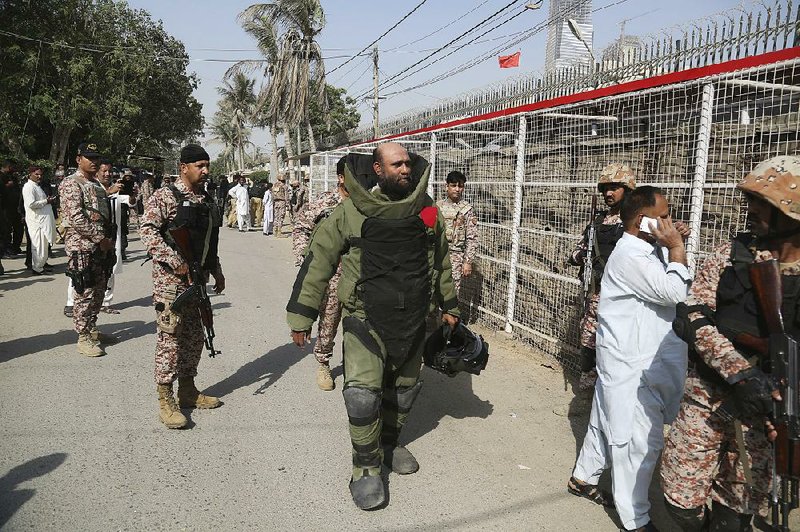KARACHI, Pakistan -- In the most significant strike against Chinese interests in Pakistan in years, three militants assaulted the Chinese Consulate in the southern port city of Karachi on Friday morning, killing two policemen and two civilians at a checkpoint before being gunned down by the security forces.
On a day of violence that included a bombing that killed at least 30 people in northwestern Pakistan, the near-miss attack on the consulate in Karachi was a rare moment of upheaval for a tightening economic and strategic partnership between Pakistan and China.
A Twitter account associated with the Baluchistan Liberation Army, a separatist group in the sprawling and violent province of Baluchistan, said that three of its members had "embraced martyrdom" in an attack on the Chinese Consulate. And a spokesman for the group was quoted by Reuters as accusing Beijing of "exploiting our resources."
Pakistan has been a showcase for China's huge international development program, the Belt and Road Initiative, in recent years. China is estimated to have spent some $62 billion on those projects in Pakistan, mostly to build a transportation corridor through Baluchistan to a new, Chinese-operated deep-water port in the Pakistani town of Gwadar.
The road corridor being built through Baluchistan, which is also rich in natural resources, is one of the most strategic projects associated with the Belt and Road Initiative. Its stated purpose is to greatly reduce shipping costs and time for Chinese goods, but it would also give China an important alternative if faced with naval blockades by the United States or its Asian allies.
Baluchistan has also been the center of two resilient insurgencies, making it one of the most sensitive areas for Pakistan's powerful military establishment: Ethnic Baluch separatists there have been pursued by a stifling Pakistani security presence, and part of the leadership of the Afghan Taliban also continues to take shelter there, in the city of Quetta.
In a video sent to an Indian news service in March, Aslam Baloch, a senior commander of the Baluchistan Liberation Army, accused China and Pakistan of plundering resources in Baluchistan, which his group wants to turn into an independent state.
Foreign Minister Shah Mehmood Qureshi told Pakistan's National Assembly that the first attacker at the consulate Friday detonated an explosive vest, while the other two opened fire and tried to rush toward the area where visas are issued.
Officials later said that two Pakistani civilians, a father and son who had come from Quetta to get Chinese visas, were also killed in the attack.
Prime Minister Imran Khan issued a statement on Twitter insisting that such attacks could not shake the relationship between China and Pakistan. He said the strike had clearly been intended "to scare Chinese investors" and came as a result of trade agreements announced during his trip to China this month.
The Chinese Embassy in Islamabad, the capital, later issued a statement extending condolences over the deaths and expressing faith in Pakistani security.
"We believe that the Pakistani side is able to ensure the safety of Chinese institutions and personnel in Pakistan," the statement said, adding that any attempt to undermine the countries' relationship was "doomed to fail."
In a rare statement about attacks in Pakistan, neighboring India condemned the assault on the Chinese Consulate, saying that "there can be no justification whatsoever for any act of terrorism."
New Delhi also said "perpetrators of this heinous attack should be brought to justice expeditiously."
After the attack in Karachi, another bombing -- this one in the Orakzai region of northwestern Pakistan -- showed the continuing threat posed by militants on a separate front.
At least 30 people were killed and 40 or more wounded when a bomb blast ripped through a fruit and vegetable market in the Hangu district there, officials said. The market was near a seminary for Shiite Muslims, a minority in Pakistan that is frequently targeted by extremist Sunni groups. But the dead included a mix of Pakistanis.
"The dead include Sunnis, Shiites and a couple of Sikh community members," said a local official, Mutahir Zeb Khan.
There was no immediate claim of responsibility for the bombing, which ended a brief lull in violence in the restive northwestern region, where the Pakistani Taliban were once active.
Khan implicitly linked the two attacks Friday, saying they represented "a planned campaign to create unrest in the country by those who do not want Pakistan to prosper."
The U.S. State Department condemned the attacks and commended the Pakistani security forces' response at the Chinese Consulate, in a statement made Friday.
"The United States stands with the Pakistani people in the face of these terrorist acts, and will continue to seek opportunities to cooperate with the Pakistani government to combat these threats in the region," said Heather Nauert, a spokesman for the State Department.
Information for this article was contributed by Adil Jawad of The Associated Press.
A Section on 11/24/2018
